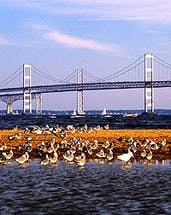Instead of paying a "flush tax," the U.S Department of Defense has agreed to spend $22 million to upgrade its wastewater treatment plants throughout Maryland. This decision ends nearly two years of legal discussions, and makes money readily available to reduce pollution to the Chesapeake Bay.
The terms of the agreement state that the Department will spend the money over the next four years and upgrade sewage-treatment plants at five of its largest installation, including naval support facilities in Annapolis.
After the upgrades have been completed, the plants will be able to treat 12 million gallons of sewage a day. State officials told The Baltimore Sun that paying to have the facilities updated is a greater benefit than paying the "flush tax."
Two years ago, Governor Robert L. Ehrlich Jr. passed a law that created a $2.50 per-household monthly fee, combined with what businesses paid in an effort to fund the new tanks, pipes and other items to upgrade wastewater plants. The Governor insisted that it was a fee, not a tax. The Navy saw the fee as a tax, and therefore refused to pay.
The agreement aids in avoiding legal battles that would not have contributed any benefit to the bay. This deal took nearly two years to complete.
In addition to the $22 million that will be spent on the plants, the Defense Department will spend $3.3 over the next two years to environmental restoration projects in Maryland. One of the issues to be addressed will be storm water runoff at bases.
Source: The Baltimore Sun


